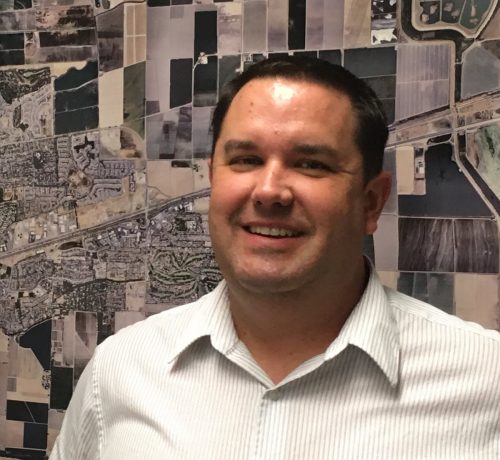
By Jason Taormino
The biggest opportunity that we have, at this moment in time, is to embrace a new future rather than have it dictated by outside forces. To start this, we need to empower our city leadership. Our chief executive should have their own vision and deliver messages in positive terms. Someone that adds energy, new ideas and can collaborate with the City Council to make everyone more effective. A leader – not a manager.
We welcome Mike Webb to be our new leader and stand ready to support him to lead us over the next decade towards sustainable prosperity.
We can make this shift of emphasis while expressing gratitude for Dirk Brazil, appreciating the previous hard work of Steve Pinkerton and understanding for the substantial efforts of the past and present City Councils. We also acknowledge that it is simply not a realistic expectation that five people, with full time jobs, can be our chief spokespeople, strategists, land planners, and financial managers in addition to their roles as policy makers.
Let’s allow Mike’s vision, fueled by a deep understanding of Davis, our culture and the historical reasons why we have not been able to achieve the next level of performance, to take hold.
Our view is that there are three main areas we need to grab onto with both hands: city revenue, employee excellence and accepting our growth trajectory.
City Revenue:
Today we are missing $10,000,000 in annual revenue and we need to make that up in short order. Twenty years from now, we will be missing $20,000,000 in annual revenue. We need to increase our top
line revenue as goal number one. Cutting staff and maintenance has already been accomplished. There are really only two levers to pull in order to increase top line revenue in the long run – expand the property tax base and increase business revenue. Our current split is 60/40. We need to build new buildings and create high paying jobs. Intel, Genentech, Apple, Amazon and just about every top name logo has chosen to go to an inferior location because they don’t have a spot in the best town in California. We need to change that with a vengeance. Adding a billion dollars worth of real estate and billions of dollars of economic activity is within our grasp.
This is not a story about growth for growth’s sake. It is about new buildings and new jobs to fund our needs and our wants. It is a simple fact that without the drivers associated with responsible new development and growth, new career opportunities suited to the community – yesterday’s hopeful future will be beyond the reach of today’s younger generation. Awareness of our alternative trajectories is essential if we are to have an honest discussion about the future. Only a lack of desire is stopping us.
Employee Excellence:
We have an outstanding leadership team, managers and great employees at the City of Davis. We need to retain and embolden our management and reate an environment where professionals feel appreciated so the best and the brightest don’t leave town. If we lose staff and institutional knowledge we are left in a sea of mediocrity. Let’s start by acknowledging our leadership and appreciating our employees. Let’s thank our policemen and women in town for responding to calls of domestic violence, child abuse, rape and dealing with mundane traffic issues. Not every incidence is dealt with properly but 99% of the time we can appreciate people doing a tough job professionally. We like the idea that we see our fire men and women on emergency calls and then picking up their kids at soccer, at local fundraisers and helping out at the senior center. It is a good thing that our Chief of Police is home grown and raised his kids in Davis. It is a good thing that we swim at the City pool with City employees, coach soccer with City employees and generally share a desire for a better future together. An exclusive community where employees can’t afford or want to live in Davis does not support a healthy and vibrant community.
Growth Reality:
In 1970 we had about 20,000 residents and 47 years later we have 65,000. That’s about 1,000 people per year. We are going to continue on that trend per our regional commitments and regional funding needs. Never mind that this growth ethic, and the opportunities presented, is what has brought two thirds of us to town. How we add those new buildings, homes and beds to town is critical. We have an unmet need for 10,000 student beds today. We can meet that need in the next five to ten years without changing our lifestyle. Each bed will bring about $1,250 in property taxes each year. That supports our economy, Yolo County, City revenue and solves a social need that is imperative. If we can move the 10,000 students out of single family detached homes and into appropriate dorms and apartments we then free up 2,500 single family homes for families. We reset the property taxes and create a home grown source of students for our local schools. It is the right thing to do and it is clearly in our financial benefit. The one time construction and impact fees generated by those 10,000 beds will solve our short term financial needs and create the long tail of revenue that will lead us toward fiscal vibrancy. Let’s not forget that the students are part of our community whether they live in town or on campus.
We have a clear need to provide housing for the homeless, our growing population of seniors, affordable housing, and we should be planning for the growing population of adults with special needs.
Bottom line – we should give our new chief executive the leeway to lead boldly and take Davis on a journey to a financially stable future.
Jason Taormino is the President of the Davis Chamber and a Real Agent and Developer in Davis.






Jason Taormino said . . . “Someone that adds energy, new ideas and can collaborate with the City Council to make everyone more effective. A leader – not a manager.“
Although the sentence above was being used to describe a City Manager, I believe it will be a major theme of the June City Council election. We have an opportunity to elect two leaders to the Council. So far there are eight candidates for the two positions.
Mary Jo Bryan
Dan Carson
Linda Deos
Eric Gudz
Larry Guenther
Gloria Partida
Luis Rios
Mark West
In the coming weeks and months I personally will be looking for the leadership skills and experiences that these eight candidates bring to the table.
This is anti-democratic. Mike Webb is not our elected leader. The City Council is. He is not responsible to us as citizens. The City Council is. I am appalled at this op-ed.
And frankly, this isn’t doing Mike Webb any favors. This kind of endorsement, from these quarters, is effectively Jason Taormino saying that the developers are taking over and Mike Webb is their man. I certainly hope that that is not the case, and that Mike Webb quickly shows us that he answers to all the citizens of Davis, not just the developers and business people.
I second Roberta’s motion. The Council sets policy and the City Manager carries it out at their direction. H/she should be beholden to the Council and not developers and profiteers.
You mean the City Leader, I’m sure.
I agree with Roberta. This article is not doing Mike Webb any favors, to say the least. Seems strange that the author apparently couldn’t envision how this would appear, to some.
And maybe, just maybe, the author, in this setting, exactly envisioned how many would perceive it.
Howard: Maybe so, although I don’t know what the (possible) motive would be. If anything, it would encourage more scrutiny. (Thinking about this more, as I write.)
Thinking more is generally a good thing…
Howard, my guess is that Jason knew exactly how some in the community would perceive the article. I doubt they were his target audience. I suspect that he is convinced that their minds are already made up. He tipped his hand when he referred to “outside forces” in his first sentence.
Well, if Matt is correct, then one might take issue regarding the definition of “outside forces”. Some “might” view development interests that way.
Controlling costs, on the other hand, has not.
Good point, Jim.
Is this a paid advertisement?
No, it is an OpEd. Based on my past interactions with Jason, I believe what he expresses here is his heartfelt belief. He has also expressed it in the Sunday Enterprise as an OpEd.
With that said, Jason has taken the time to lay out one alternative plan for a sustainable future for Davis. I personally believe it would be good dialogue if others who have other plans for a sustainable future for Davis submit them as articles to the Vanguard the way Jason has.
For a different take, let me suggest that somebody must take the reins with respect to maintaining the solvency and fostering the future prosperity of our municipal enterprise. It is not as if the City government, and all its employees, is some kind of amorphous organization where everything is magically supposed to stay in balance and gradually improve over time. It is an organization, like any other, that demands active management, leadership and inspiration in order for it to succeed and prosper.
Over the past two decades, the city and the community have undergone some major transformations. Fiscally, it started in 1999, as the city took on a higher pension commitment without any game plan as to how it would fund this increased expenditure. It continued in the early 2000’s with the passage of our dual slow growth measures J & R which effectively cut our rate of growth to 1/3 of its historic average during the previous 100 years. Finally, we are nearing full build-out of the 10 square miles established for the boundaries of our city. Already, before any new efforts at densification, Davis is one of the most dense (as measured by residents per square mile) small towns in America.
At the same time these changes were transpiring, the university has accelerated the number of new students arriving into the community each year – placing increased pressures on local housing stock and land available for development. That trend is not likely to change anytime soon.
Who, if not the City Manager and City Staff, should be charged with monitoring and reporting back on the direction, trajectory and fiscal sustainability of the municipal enterprise? City Councils and City Commissions come and go. The one institution, and its supporting staff, which endures over time is our City Government.
As a result, quality and continuity of leadership in our municipal enterprise should be of profound importance to everyone. In the business world, we would be talking about the business plan of the enterprise as a key indicator of how the organization is approaching both our current challenges as well as the future. I profess; I am not as familiar as I should be with the business plan for the city.
It is not enough to say our plan is to continue cutting expenses. It is not enough to simply say that the university should be managing its own customer impacts. If we are to pull our collective heads out of the sand and are to move beyond this stagnated conversation, newfound leadership will be required.
Mike Webb has the experience, institutional, technical and managerial skills to help us accelerate towards a sustainable new phase in the city’s history. Being City Manager cannot be an easy job, but I join Jason and others in the business community as we welcome Mike to this important new leadership role within our community.
Govenors come and go. Senators come and go. Presidents come and go. And yet these are the people we elect to govern us, to make decisions, to set the tone, to enact a vision. Not the staff who work for the government — who should not be confused with our “City Government.”
But this is not the business world, and thus, many more factors need to be taken into account, such as the welfare of citizens, preserving and protecting the things they value, etc.
And students are not customers.
Your choice of words reveals your extremely narrow, money-centered view of the world.
But this is not the federal government with full time, professional, paid politicians at the helm.
This is a city with a strong city manager form of government.
With due respect, whom would you suggest that we be asking for a copy of the business plan for the enterprise? To whom would you address the question: “Why are our finances so far underwater, and what is the plan to restore solvency?
Out of curiousity, if students aren’t customers, what are they?
It is a strong city manager form of government, that is true. But that doesn’t mean that the City Manager sets the policy or direction for the City. If you think that the current system is lacking in leadership because all of the Council members are part-time, then the thing you should be advocating for is more money for the City Council so that people can devote more time to it; the answer is not to have an unelected employee set policy. (Many City Council members work full time and devote many, many hours to the City, resulting in a pittance per hour, but that is a deterrent for more people to run for Council, and the truth is, there are only so many hours in a day and only so many hours before even the most energetic person gives out).
I would ask staff for factual questions and analysis. I would ask City Council members about their vision and their plans for the City, the decisions that they make based on the facts and analysis that the staff gives them.
If students were customers, they would set the content of the classes and they’d all be getting A’s, yes? Oh, but that would be pointless, right? The degree would be useless. So, instead, we have faculty who are considered experts in their respective fields design the courses and the majors, and they are the ones who determine to what extent a student has learned the material.
Roberta:
I agree with much of what you write, but I view students as “customers” of universities. They pay good money (some, $42K per year at UCD) to receive an education. UCD also has to “compete” with other universities (including some within the UC system, itself) for “customers”.
Part of what the customers are purchasing is “practice” and preparation for the working world, with instructors acting as “practice bosses”.
Very few “customers” would subject themselves to the expense, stress, and effort to obtain a degree, if it did not have some value in the working world.
UCD is pursuing higher-paying (International) customers, lately. (Pretty much providing the same “product”, regardless of how much the customers pay.)
Ron, this is completely off-topic, so I’ll be brief. It’s true that students pay for a good education. But that is the only way in which they are “customers” — I would disagree with all the other points you make. Being similar in one respect does not make them customers. And so, you might ask, if they are not customers, what are they? Well, they are students, paying for an education. Not everything should be understood through the lens of a business, which tends to strip away many relevant factors.
Point noted.
Roberta said . . . “If you think that the current system is lacking in leadership because all of the Council members are part-time, then the thing you should be advocating for is more money for the City Council so that people can devote more time to it; the answer is not to have an unelected employee set policy.”
State Law constrains what can be done in order to achieve what Roberta is suggesting. The first constraint is that no City Council can vote a raise for themselves. They can only vote a raise for the next Council. The second constraint is that Councils can only raise their pay by a maximum of 5 percent per year (non-compounded)
The Davis Council Salary history is as follows:
2000 – $669.49 per month ($8,034 per year)
2014 – $1,138.00 per month ($13,656 per year)
2018 – $1,313.00 per month ($15,756.00 per year)
In addition to salary, while Government Code section 36516 establishes a limit on compensation for City Council Members, the City may provide benefits to its City Council Members without violating the compensation limit. Specifically, “any amounts paid by a city for retirement, health and welfare, and federal social security benefits shall not be included for purposes of determining salary under this section, provided that the same benefits are available and paid by the city for its employees.” Gov’t Code § 36516(d).
Bottom-line, with a raise limit of 5% per year, Davis will never get to a point where there is sufficient money for the City Council so that people can devote more time to it.
The job is called city manager for a reason. He is not the CEO of the city. This is really a very strange article. I seriously doubt that the council envisions this role for Mike Webb, and really doubt that he does either. I also doubt that the residents of Davis envision or embrace a massive redevelopment of downtown Davis. It seems, if I’m reading this right, that Jason thinks all 10,000 of the beds should be provided via private development. Overall, I think this just suggests that the current leadership of the Chamber remains out of touch with the Davis electorate.
The city council sets policy and the city manager manages the staff and implements policy.
What you describe, as written, is a City Administrator.
A City Manager develops policy, recommends policy, and checks in with the CC to ratify or modify the recommendations. A good City Manager listens to SME staff, particularly department heads, to determine where policy changes are warranted, consults with them in development of policy.
The CC can also propose/set policy, but unless they do so in close consultation with a good CM, they are apt to “do stupids”, or shift from 5th gear to reverse, with the concomitant grinding of gears and resulting extensive damage to the transmission of services.
The CM serves at the pleasure of the CC. Kind of a “checks and balances” thing.
Not bad – I like the “twist” at the end! You apparently have a bit of poetic talent, previously unnoticed.
“to embrace a new future rather than have it dictated by outside forces. ““Intel, Genentech, Apple, Amazon and just about every top name logo….”
Everyone of which would represent a major “outside force” given their sites of origin & without any kind of reference to whether the size and type of project they would likely propose would be compatible with Davis given the seeming preference of the majority to remain a small city.
“Jason Taormino saying that the developers are taking over and Mike Webb is their man”
Jason Taormino, at a recent Vanguard conclave, in response to my question about the meaning of a word that he had used repeatedly during his presentation defined ” vibrancy” ( paraphrased) as meaning that the city has enough revenue to pay for “what we want”. I would venture that he is using the word “we” to mean those who share his vision of a rapidly expanding downtown and city and is not reflective of those who prefer a much slower rate of growth.
“This is not a story about growth for growth’s sake”
From what I have seen over the past few years of really paying attention to proposals for development in our town, I beg to differ. I think this is exactly what it is. I think that Rochelle Swanson stated it clearly while campaigning when she opined that “Davis should grow as we can” or as Jim Gray did when he showed in graphic form a representation of his belief that a city is either growing or decaying ( completely ignoring the possibility of having achieved a healthy balance). I believe that there are those in our community that believe that we can “grow our way out of trouble”. I am not a fan of this thinking any more than I believe that we can sustain a no growth community.
None of this is meant to be a reflection on the abilities of Mike Webb as City Manager, but rather the weaknesses that I see in Jason Taormina’s suggestion that he play a larger role than City Manager.